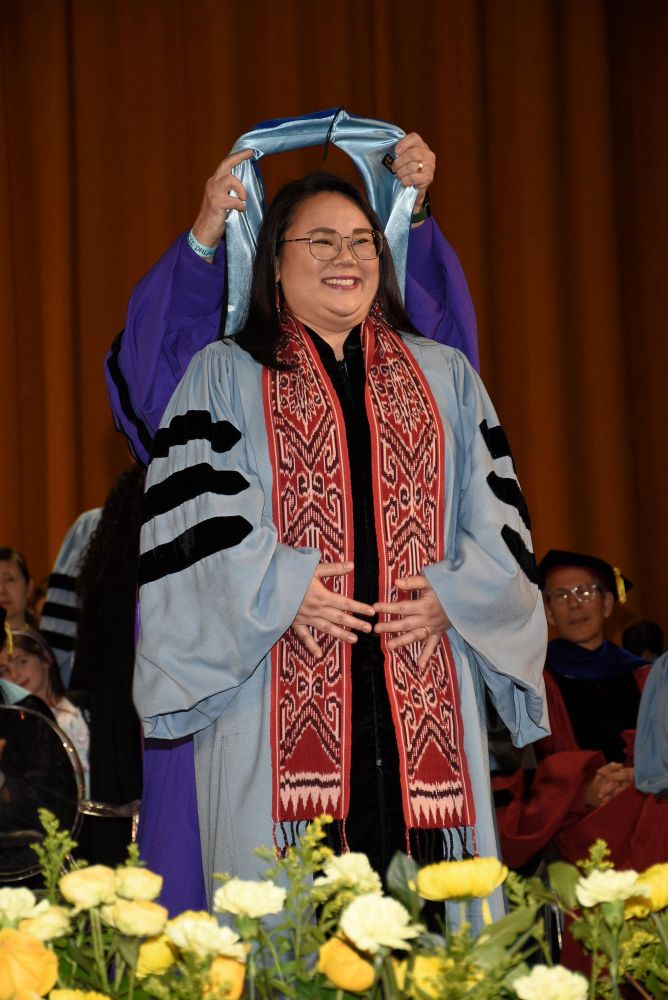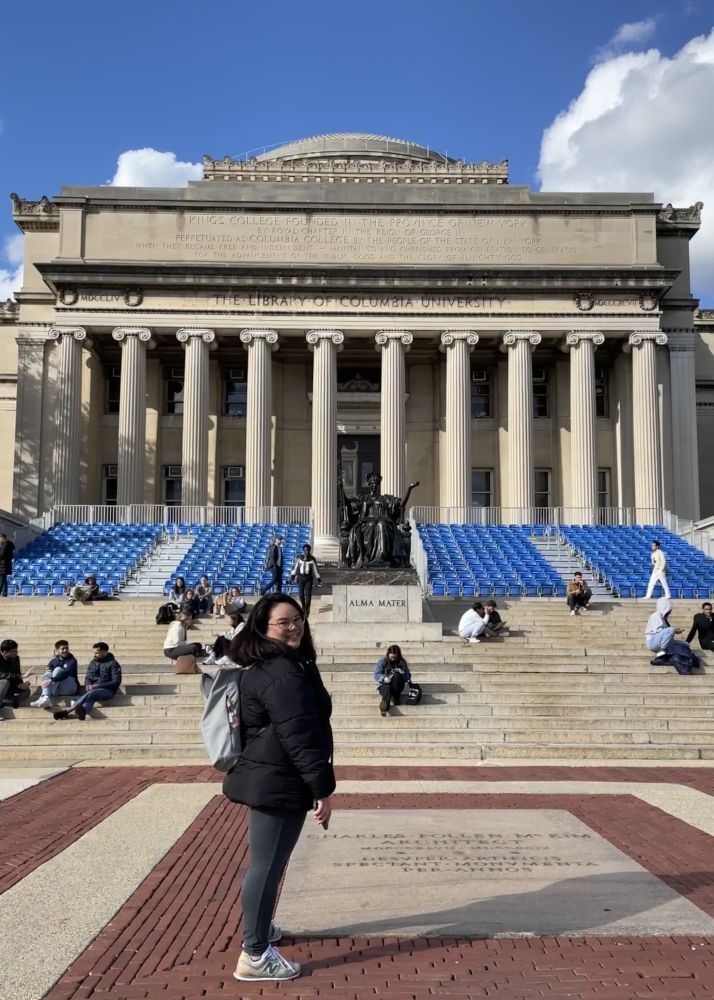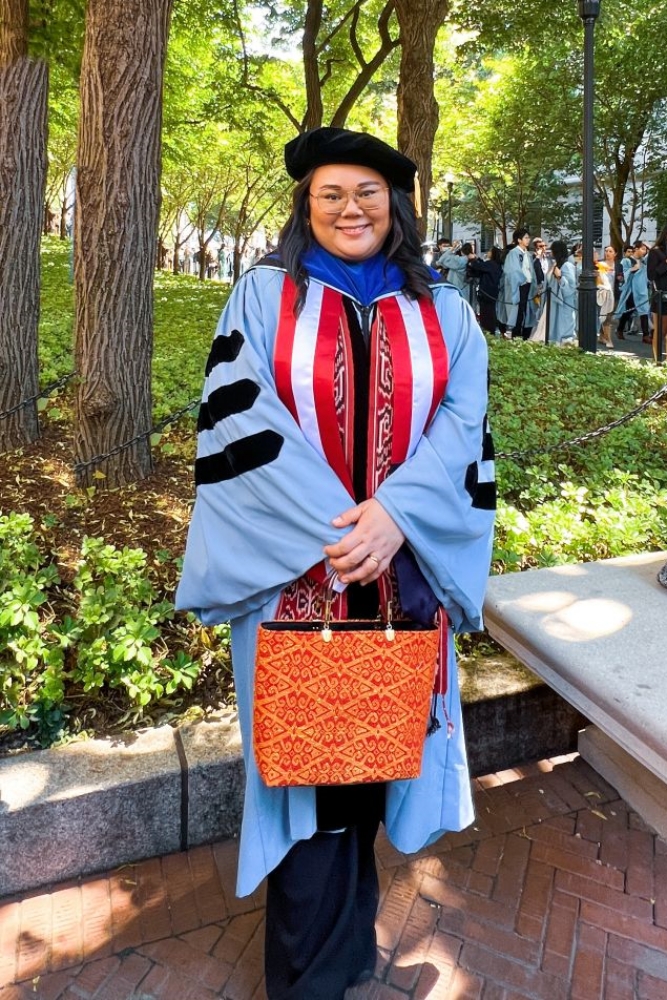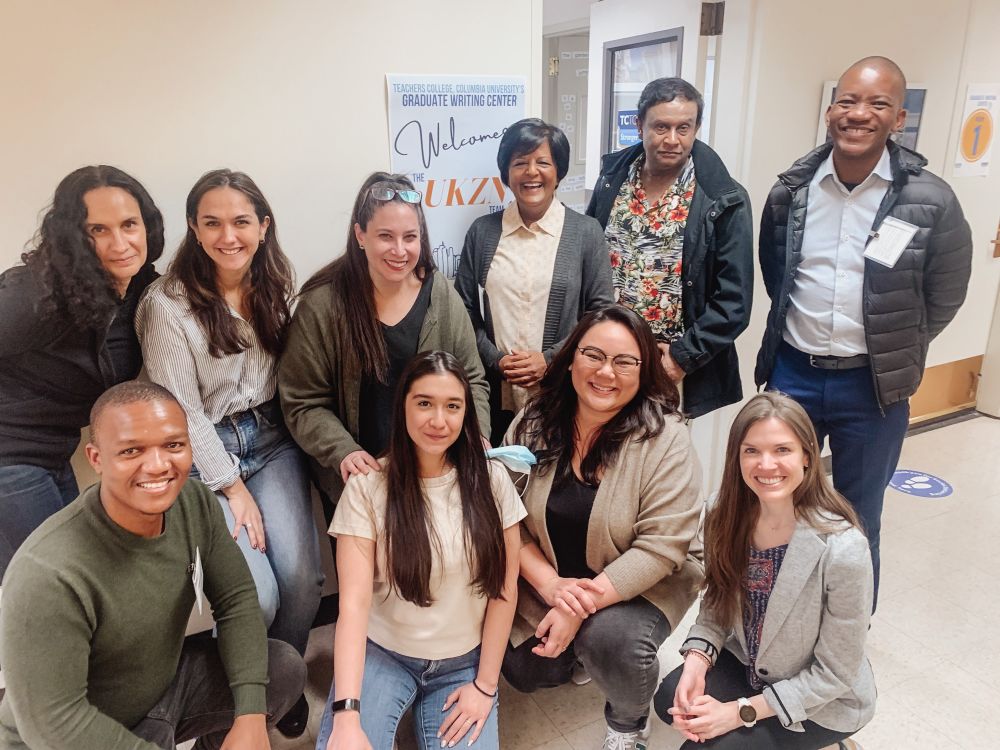
Felicia highlighted Sarawak in the eyes of the world by wearing an Iban scarf on her Columbia University graduation robe during the ‘Hooding Ceremony’.

WHO would have thought what started as a dream has become a reality for Dr Felicia Genie Tersan – the first female teacher from the Iban community to receive a Doctorate of Philosophy (PhD) from Columbia University in New York, one of the world’s leading universities in the United States of America.
Hailing from Sungai Tanduk, Undup in Sri Aman, Felicia, 38, received her scroll during the convocation ceremony on May 17 and 18 after successfully completing her PhD in English Education from Teachers College Columbia University, one of the eight research universities listed as Ivy League institutions along with Princeton University, Brown University, Cornell University, Dartmouth College, Harvard University, University of Pennsylvania and Yale University.
Ivy League institutions are seen as the most prestigious universities in the world and are known for their rigorous selection of students.
Felicia shared that she initially felt she was ‘not good enough’ to be accepted into Columbia University, and never expected her efforts to introduce Sarawak to the eyes of the world would be accepted at the institution.

Felicia takes a photo against the backdrop of other graduates during Columbia University’s commencement ceremony.
“Honestly, I didn’t think I would be given the opportunity to enter Columbia because firstly, the fees are expensive and I come from a modest family. Secondly, I didn’t feel I was good enough to go to this university.
“However, due to my research interest in teacher professional development and rural community education, I set a goal to continue my PhD under my supervisor who happened to be at Columbia and had the same research interest in this field.
“So I tried my luck by contacting my supervisor via email and explaining my plans. Thankfully I received positive feedback and encouragement from her to apply there,” she said.
Prior to starting her PhD studies in June 2019, Felicia found the application process to Columbia to be quite complicated and time consuming.
“In addition to complying with the requirements where Master’s and Bachelor’s transcripts, Test of English as a Foreign Language (TOEFL) scores, letters of support and so on needed to be sent, I also had to prepare a strong statement of purpose as to why I was the right person for the PhD programme.

Felicia with Prof Bob Fecho, former Teachers College English Education program director, and her supervisor Prof Ruth Vinz.
“From there, the faculty members of my chosen programme reviewed my application and decided whether to offer me a position to become a Columbia University PhD student,” she said.
Studies sponsored by MoE
Felicia considers herself lucky because her PhD studies were funded by the Malaysian Ministry of Education (MoE) under its Hadiah Latihan Persekutuan (HLP) programme, where successful educator applicants are offered Cuti Belajar Bergaji Penuh Dengan Biasiswa (CBBPB), or fully-paid study leave with scholarship.
“Because of that, I was ‘brave’ to apply to Columbia because it was funded. Even before I left, my parents sacrificed a lot to ensure that I was financially able to start life in another country.
“But thankfully when I was there, I didn’t bother my parents at all about financial matters because I was determined to obtain my PhD without burdening them, since both of them are retirees.

Felicia is in front of the bronze sculpture of the Alma Mater and Columbia University’s Low Memorial Library.
“Indeed, the cost of living in New York City is very high. At times, money was really tight because the sponsorship allowance was all used to pay the house rent which reached more than US$2,000 (RM9,300) a month. My salary received in Malaysia was used for commitments in Malaysia.
“Sometimes when times were desperate, I would get items from Columbia’s free food pantry to cook my meals. In fact, my survival skills were really tested throughout my studies.”
Promoting Iban culture in America
Felicia says she is very proud to represent the Iban community in obtaining a PhD at Columbia University, especially when her research thesis titled ‘Coaching Across Cultures: A Narrative Inquiry of Instructional Coaching in Rural Sarawak’ was selected to receive the Doctoral Dissertation Award.
“From the results of my search in the list of Columbia University alumni, as far as I have found, there has never been an Iban student who obtained a PhD from Columbia. Therefore, I decided to highlight the Iban identity while I was there, including in my thesis.
“In my thesis, I highlighted the state of Sarawak and our multiracial culture, so when I was selected to receive this award, I was very honoured.
“For me, this means that Sarawak and my community’s culture are appreciated on the world stage. When I went on stage for my ‘doctoral hooding’, I also wore an Iban scarf on the robe.

Screenshot shows Felicia (top right) with her Dissertation Committee members after she passed her dissertation defence.
“I can’t describe the feeling of having the honour of raising the pride of the Iban community and Sarawak.
“When wearing the Iban scarf, the people there asked about it and I took the opportunity to explain about the designs on the scarf and its connection with the culture of the Iban community.
“During the convocation ceremony, I also brought a bag made by my aunt using ‘pua kumbu’ cloth woven using gold thread by my late grandmother when I was a child. The fabric is now over 30 years old,” she shared.

In addition to wearing an Iban scarf, Felicia also carried a bag made using ‘pua kumbu’ cloth and woven using gold thread by her late grandmother during the commencement ceremony.
Dealing with life abroad
Felicia described her four-year PhD study period in the United States as “a very short period of time” considering the classes that needed to be taken and assignments that had to be completed each semester.

Felicia (centre) holds the Sarawak flag while posing for a photo in front of the Statue of Liberty in the winter of 2019.
“The biggest challenge for me was having to be away from my family – it was just me and my husband there during that period.
“In the middle of the Covid-19 pandemic, my husband’s grandmother died of cancer. We were both very sad because we couldn’t go back to Malaysia at that time because of the strict protocol.
“And when my father was diagnosed with cancer and I could not be in Kuching to take care of him, it filled my heart with even more sadness.”

Felicia (left) and her husband (right) at a dinner at her supervisor Prof Ruth Vinz’s residence to celebrate her PhD graduation.
Nevertheless, Felicia said this strengthened her resolve to complete her PhD as quickly as possible so that she could return to Sarawak to be with her father and family.
Establishing a doctoral student writing group
Felicia said completing a PhD is indeed a journey faced alone, as shared by many PhD holders.
“At Teachers College in Columbia University, there is a Graduate Writing Center that has been established for a long time, where they support students in academic reading and writing.
“They already have a writing group for PhD students who meet face to face. The group is not big and they just gather together to write and there is not much sharing of knowledge.
“Because of that, when the Covid-19 pandemic hit, I started a Doctoral Writing Group in collaboration with the Graduate Writing Center, and we would meet once a week online for three hours to write together.

Felicia in front of the entrance to Teachers College, Columbia University.
“Each week, I would lead the meeting and we would set goals, track our writing progress, and share academic writing tips with group members.
“The members, who are also PhD students in Columbia, would also share tips and strategies to improve their reading and writing skills. It was a perfect platform to work together and form a partnership.
“For me, the existence of an academic writing community like this is very important so that PhD students do not feel alone in their doctoral journey,” she explained.

Felicia upon finishing writing and sending her full dissertation to the Office of Doctoral Studies at Teachers College, Columbia University before going through the viva voce process.
Experiences, challenges, and needs of teacher coaches
Felicia’s experience as a School Improvement Specialist Coach Plus (SISC+) since 2014 inspired her to conduct a qualitative study in the form of narrative inquiry that focuses on the experiences, challenges and needs of SISC+ teacher coaches.
“The informants of my research consist of SISC+ who guide teachers in the interiors of Sarawak that is well known to be made up of multiracial ethnic groups.
“Among the important things highlighted by the informants is the need for contextualised preparation and support for these teacher guides according to their respective contexts, that emphasise and celebrate each community’s culture.
“The fact is, our challenges and needs in Sarawak are different and unique,” she added.
She therefore hopes that with the expertise that she has, she can contribute in terms of increasing contextualised support for teachers in Sarawak, especially English teachers, according to the needs and collective strengths of the community where their schools are located.
In addition, Felicia also hopes to contribute to improving the quality of English teaching and learning through programmes that capitilise on the strengths of multicultural Sarawak, in order to increase the potential and marketability of Sarawakians on the world stage.

Felicia (front, second right) poses in front of the Graduate Writing Center together with academics from the University of KwaZulu-Natal (UKZN) South Africa who visited the Teachers College, Columbia University.
Big dreams and high ambitions
Felicia advises the children of Sarawak who are going through school or higher education to strive and not give up in achieving their high ambitions.
“Nothing is impossible. But, without effort, we cannot realise our dreams. Everything can be achieved if we have efforts and goals.”
Felicia has been in the education service for 14 years, starting her career as an English teacher at SMK Pusa in 2009. Her last school was SM Sains Kuching Utara in 2014 before serving as an SISC+ Language Officer at the Padawan District Education Office from 2014 to the present day.
Felicia holds a Bachelor of Education (Hons) in Teaching English as a Second Language (TESL) from Universiti Kebangsaan Malaysia, and a Master of Education in TESL from Universiti Teknologi Mara.
